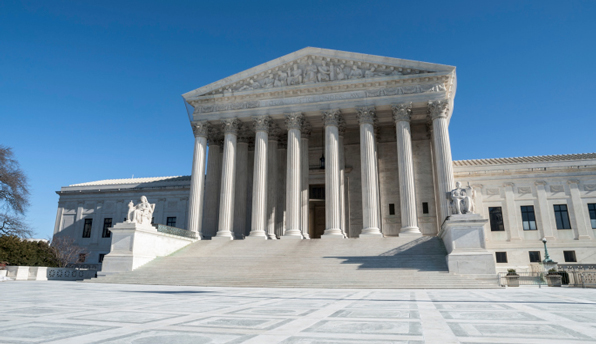

On March 14th, Cato Institute ran an article entitled "SCOTUS Deferred to Executive Agencies. What Happened Next Will Infuriate You!" The article and surrounding documents go a long way toward explaining why executive agencies have acquired such mind-boggling power in the United States. And a recent court decision may make executive agencies much more aggressive, or less, depending on whether the case is successfully appealed to the Supreme Court.
What Is an Executive Department and Agency?
Executive Departments, such as the Department of Justice or Labor, are federal administrative bodies that enforce laws created by Congress or enforce executive orders. They are overseen by the president who appoints their chief administrators. The department heads, called secretaries, form a cabinet that advises the president, and they are guided by him in turn.
To administer the federal programs under their jurisdiction, the departments each create sub-agencies. For example, the Department of Interior is responsible for managing and conserving federal land and resources; to execute its responsibilities, the department has created an array of sub-agencies such as the Fish and Wildlife Service. The regulations created and enforced by the unelected agencies usually have the force of law upon individuals and businesses.
The Separation of Powers
Article I, Section 1 of the U.S. Constitution grants the power to make federal law to Congress. Articles II and III grant executive power to the president and judicial power to the federal courts. This establishes a separate of powers by which each branch of government can exercise only the functions assigned to it. Each branch acts as a restraint upon the others. At least, that's the theory.
Executive departments and their agencies are sometimes called the fourth branch of government. It is a branch that exercises the functions of all the others. In other words, departments overseen by the president (executive) can create their own policies (legislative) and enforce them according to their own legal interpretation (judiciary).
One reason for the nearly unrestrained authority of the agencies is that the judiciary has generally taken a broad interpretation of Article I, Section 8's "necessary-and-proper" clause, which is also called "the elastic clause." It allows the government to "make all laws which shall be necessary and proper for carrying into execution" of the powers vested by the Constitution. The clause has always been controversial, even before the Constitution was ratified. At the ratifying convention in Virginia, for example, Patrick Henry argued passionately that the clause offered boundless power to the federal government. In The Federalist Papers No. 44, however, James Madison argued at length for the clause without which he said the Constitution would be a "dead letter." He also commented on how the clause had engendered more debate than any other part of the Constitution.
It continues to do so. Many subsequent commentators have claimed that the clause indicates the intentions of those who drafted the Constitution; namely, to create powerful federal agencies to administer the law. This position has dominated partly because the separation of powers was seen as strong protection against overweening bureaucracies. In theory, the rules and regulations of an agency must accord with administrative powers it receives from Congress or through an executive order. In practice, the rules and regulations are often interpreted by the agency itself.
A Judicial Challenge to Judicial Deference
In March, Cato Institute joined with other petitioners to file a brief before the United States Supreme Court urging it to hear a case that had been partially reversed on appeal by the Ninth Circuit Court.
Ilya Shapiro, a senior fellow in constitutional studies at Cato Institute, provided some background on how the extreme power of executive agencies developed. He wrote, "In the 1996 case Auer v. Robbins, the Supreme Court ruled that where there is any ambiguity or disagreement over what a federal regulation means, courts should defer to the interpretation favored by the agency that issued the regulation." (Note: Auer was decided in 1997.)
The principle expressed by the Supreme Court in Auer v. Robbins is sometimes called Auer deference or judicial deference. It is a legal doctrine that a court can invoke when refusing to rule against an agency; namely, judges should not act to frustrate the constitutional right of Congress – the power to make law – by preventing the enforcement of the law through agencies.
A November 13, 2013 finding of the Ninth Circuit Court of Appeal on Rivera Rivera v. Peri & Sons Farms, Inc. pushed judicial deference one step farther. Indeed, the ruling is what prompted Cato to petition the Supreme Court. In Rivera, a large family farm in Nevada ran up against the Department of Labor (DOL).
For years, the DOL had interpreted the Fair Labor Standards Act (FLSA) in such a manner that employers were not responsible to compensate Mexican temporary farmworkers for their travel and immigration costs, such as visas. Now, as the Employment Law Daily explained, "[T]he Ninth Circuit revived a claim for immigration and travel expenses brought by … workers whose expenses in procuring employment and traveling to the United States dropped their pay below the minimum wage." The claim was revived because the DOL had "clarified" a provision of the FLSA, which changed the Act's effect, and the federal court was not willing to overrule the DOL as the state court had done.
The Ninth Circuit's 'one step farther' in Rivera came in the statement that an agency's interpretation of its own regulations should stand even if its current view contradicts its former ones. The Ninth Circuit stated, "A change in an agency's interpretation does not present a 'separate ground for disregarding the [agency's] present interpretation' unless the change leads to 'unfair surprise'." Given the consistency with which federal courts side with federal agencies, it may be difficult for anyone to prove 'unfair surprise.'
Shapiro commented on the expansion represented by the court's statement. "Under that logic, an agency could spend decades saying that its regulation governing footwear only applied to shoes – and then, without warning or consultation, unilaterally decide to extend the rule to sandals and slippers (despite explicitly saying for years that they were not covered by the regulation) …. Such a power to rewrite regulations through after-the-fact "reinterpretation" is incredibly tempting, freeing agencies to change the rules of the game without further legislation or congressional oversight, or even the formalized rulemaking process required by the Administrative Procedure Act."
Specifics of the Cato Brief
The Cato brief argues that judicial review is "necessary to preserve [the] separation of powers," which is necessary to preserve individual liberty. It asks the Supreme Court to "reconsider the judicial doctrine of deference." In fact, the act of "granting controlling deference to an executive agency's interpretation of its own regulations" is called "an abdication" of the court's constitutional duty. Allowing interpretations to change and, yet, be valid means that the "agency is left free to view conduct occurring after the regulation was promulgated and determine in hindsight if that conduct should have been included in the scope of the regulation." In short, judicial deference grants administrative agencies "binding authority over judicial functions," which is unconstitutional.
The brief points to sitting Supreme Court justices who have expressed doubts about judicial deference. In his opinion on Talk America v. Michigan Bell Telephone Co. (2011), Justice Scalia stated: "It seems contrary to fundamental principles of separation of powers to permit the person who promulgates a law to interpret it as well. Deferring to an agency's interpretation of its own rule encourages the agency to enact vague rules which give it the power, in future adjudications, to do what it pleases …. We have not been asked to reconsider Auer in the present case. When we are, I will be receptive to doing so."
In Decker v. Northwest Environmental Defense Center (2013), Chief Justice Roberts and Justice Alito wrote an opinion saying it was inappropriate to reconsider judicial deference in this case. But Robert stated, "I would await a case in which the issue is properly raised and argued."
The brief identifies other Supreme Court justices who have expressed reservations. "Justice Thomas, joined by Justices Stevens, O'Connor, and Ginsburg, expressed concerns over the consequences of encouraging agencies to promulgate vague regulations. In particular … by deferring to an agency's interpretation of a 'hopelessly vague regulation' the Court enables the agency action to 'replace statutory ambiguity with regulatory ambiguity'." (Note: O'Connor is retired.)
Does this mean Cato's petition has a chance of succeeding? Law professor Jonathan H. Adler asked himself the same question. He answered: "Perhaps, but the Court passed up a prior opportunity to do that just last term. Nonetheless, it is clear that at least one justice [Scalia] would like to see Auer put to rest."
[T]here is no liberty, if the judiciary power be not separated from the legislative and executive. Were it joined with the legislative, the life and liberty of the subject would be exposed to arbitrary control; for the judge would be then the legislator. – Montesquieu The Spirit of the Law.
